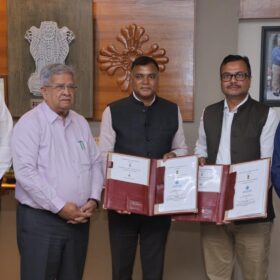Gyanesh Chaudhary, as a part of CII delegation, was one of the speakers at International Solar Alliance (ISA) Founding Ceremony Curtain Raiser, held in collaboration with MNRE and CII at 23rd Conference of Parties of the United Nations Framework Convention on Climate Change (COP23) on November 13, 2017.
At the presentation, he said, “ISA stands as the perfect opportunity for faster innovation, cost reduction, quality improvement, demand creation, and mass production of solar components in India. ISA is estimated to bring $1 trillion investment for solar growth for its member countries. This financial support pairing with the implementation of tried and tested best policy framework (from successful scenarios) will help in encouraging solar manufacturing and implementation within India.”
The session at CoP23 served as the Curtain Raiser for the ISA’s upcoming Founding Ceremony. It featured presentations on ISA programmes and a report on Common Risk Mitigation Mechanisms (CRMM), as well as a panel discussion on the global effort to accelerate solar energy deployment.
pv magazine: Could you brief us about the CII delegation that came to COP23 addressing ISA?
Gyanesh Chaudhary: It is the reinforcement of International solar alliance, which is a massive initiative started by the government of India. At present, there are confirmed 44 countries that have signed the ISA framework agreement and 15 countries have ratified, and next month in December it will be an official international intergovernmental legal body headquartered in India. It is a huge landmark that Indian government has achieved.
The event was mainly to educate and inform everybody about ISA. There were various presentations about several programs, for example, rooftop program, etc., and bilateral interactions with different countries representatives were held. It was a curtain raiser for ISA founding ceremony, which will now happen sometime in January. However, the date is not yet confirmed.
The idea was to launch the ISA early next month, and then start the entire process of sharing information database, skill, and development plans. So, all the member countries will be initiating this as their agenda jointly.
The founding ceremony was supposed to be held on December 05-06, 2017, what is the main reason for its rescheduling to next year in January?
The main reason is the partner country France, its president Emmanuel Macron was unavailable during that time because of elections in France and other purposes. And in total five countries out of 44 countries also have elections during that time.
What is the agenda of India at COP23?
Two main agendas are Finance and risk mitigation: de-risking Solar. And if we consider the third agenda that would be off-grid.
Th idea behind India’s participation at COP23 is to build more confidence amongst various stakeholders, to come together and discuss how to initiate to take significant actions to mitigate the climate change and accomplish the climate commitments made by the government. To attract funding, to interact with international stakeholders, who will play a very crucial role in India’s solar achievements.
How will Common Risk Mitigation Mechanism (CRMM) work?
Basically, whether it is high capital, high level of technology, or rapid growth in any sector, there is always a risk involved. The whole idea of ISA is to facilitate an affordable finance for solar, which will help in supporting agriculture, mini and microgrid all of that for the member nations. So, in the process, all the experience will be shared, and all the risk will be brought to the front where there will be standard protocol formulated to mitigate them. The fund is also being created for this, approximately more than $1 billion has already been allocated for the ISA physical roadmap. So, to create an integrated global solar market and adopt it and support across ISA member tropical countries.
Ministry of Environment and Forests statement “COP 23 is critical and maybe the last chance for the developing countries to fight for their right to development and the global carbon space by ensuring that the developed countries act on their pre-2020 commitments.” Can you say something on this?
Strength is when you come together, means all the 121 countries under ISA, if they (developing countries) jointly negotiate with the developed and polluting countries, to mitigate and subsidized their effort, it will automatically drive the growth of the solar alliance. And, a lot of it is aggregating the demand also, let’s say, there is the important water pumping programs, where 500,000 pumps are going to be aggregated and deployed across all the members. And that will help reduce cost without compromising the quality because initiatives are going to be standardized.
During his presentation, he further added, “Innovation is the only key to reach global competitiveness, control prices of solar, and improve the solar industry. Cross-country collaboration through ISA can help the India and other developing countries in finding the best support for innovation. Making way for cost reduction, quality improvement, and mass production of solar components. Technological exchange within the 121 member countries of ISA will make a path to innovation clear and easier.”
Innovation is the primary focus that you and India have addressed at COP23, what importance it has for India for ISA?
I think, for any field, whether it is solar, innovation is essential, and I remember the title of Bill Gates book called “Business at the speed of thought,” and that is true. In the last 11 years, I have been associated with solar industry through Vikram Solar and focused on growth, where the large part of that has to come from the technology changes and innovation which is a continuous process. And unless, the industry, government, or all the stakeholder, whether it is NGO or consumers, everybody needs to be aware and updated as to what is the new trend in the market. It is innovation that has brought the cost down, that has made solar affordable in last five years, and we definitely will continue with that.
Do you see any difference concerning policy or initiative compared to last year?
Yes, India has grown in last one year. The rooftop segment has grown up by 97%, and utility-scale has grown at 145%. All these installations happened primarily because of the all the policy initiatives and the stakeholder engagement which is going on continuously. All these growths have happened, but still we are not satisfied, as India can do much more than this because the targets are pretty economical, so hopefully the coming years the size and scale will increase multiple folds.
India still tackling the issue of anti-dumping and it is not yet resolved, so what is your take on this when it will be decided?
There is no timeline as such, there is a lot of deliberations going on, so we are hoping that it will be in favor of the manufacturer and not just in one category of manufacturing but for the cell, for the module or other components associated with the sector, and for everybody.
Will solar manufacturing sector boom if anti-dumping will come and what is the major challenge for the industry?
We need a fertile ground funding; we are hoping that it will happen soon because the US is coming up with anti-dumping regarding their product, Europe already has minimum import price. India, so far, does not have anything and we are hoping that it will come very soon to protect the interest of domestic manufacturer. The challenges only to achieve a specific scale with a firm footing in the domestic market, when that is addressed, then there is no holding back.
This content is protected by copyright and may not be reused. If you want to cooperate with us and would like to reuse some of our content, please contact: editors@pv-magazine.com.








By submitting this form you agree to pv magazine using your data for the purposes of publishing your comment.
Your personal data will only be disclosed or otherwise transmitted to third parties for the purposes of spam filtering or if this is necessary for technical maintenance of the website. Any other transfer to third parties will not take place unless this is justified on the basis of applicable data protection regulations or if pv magazine is legally obliged to do so.
You may revoke this consent at any time with effect for the future, in which case your personal data will be deleted immediately. Otherwise, your data will be deleted if pv magazine has processed your request or the purpose of data storage is fulfilled.
Further information on data privacy can be found in our Data Protection Policy.